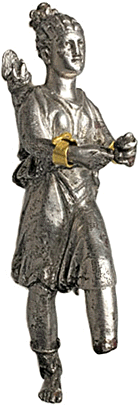...Best of Sicily presents... Best of Sicily Magazine. ... Dedicated to Sicilian art, culture, history, people, places and all things Sicilian. |
by Vincenzo Salerno | |||
Magazine Index Best of Sicily Arts & Culture Fashion Food & Wine History & Society About Us Travel Faqs Contact Map of Sicily
|
Little is known of the Proto-Sicanians and their religion, but their temples on Malta are the oldest free-standing structures (and the oldest-known places of worship) in Europe. It has been suggested that the earliest "modern" humans populated Mediterranean Europe around 40,000 years ago, and physical evidence (such as human fossils and cave art) indicates a human presence in Sicily at least 10,000 years ago, long before the Indo-European influence. It is generally believed that the Sicanian language, unlike Etruscan, Elymian, Punic, Greek or Persian, was not an Indo-European tongue. Whatever the case, prehistoric Sicanian culture cannot be compared to, for example, the more sophisticated society of the Sumerians. Why is this important in the study of the earliest religions? It is relevant because of the generally accepted theory that the Indo-Europeans perpetuated not only their language but their religious beliefs (mythology, a priestly class) and social traditions (villages, tribal kingship, families) as well. An earth mother and various deities identified with nature were part of this early Eurasian and Mediterranean mythology. The Sicanians themselves embraced such mythology, as well as specific agricultural practices and patriarchal families. But did their neolithic ancestors share these ideas? This is impossible to know with certainty. The Proto-Sicanians living in Sicily circa 5000 BC were not united; when the Indo-European Elymians and Sicels arrived en masse even the Sicanians were not a unified population. Their social practices and religions could have varied as much as those of the American Indians. The Greeks sometimes sought to represent the Sicanians as a unified people (the story of the legendary King Kokalos comes to mind), but few of these ideas can be traced to before 500 BC, and initially the Greeks refused to intermarry with the Sicanians. Comparative analysis (reference to other non-Indo-European societies in Europe and northwestern Africa) would suggest that the Proto-Sicanians placed great value on the forces of nature as quasi-religious concepts, but their religion was neither animism nor formal mythology, though they may have believed in an afterlife. (The miniature statuette shown here is actually Greek.) About the Author: Palermo native Vincenzo Salerno has written biographies of several famous Sicilians, including Frederick II and Giuseppe di Lampedusa. | ||
Top of Page |
 The Proto-Sicanians inhabited Sicily prior to the historical period and identification of the society later identified as "
The Proto-Sicanians inhabited Sicily prior to the historical period and identification of the society later identified as "